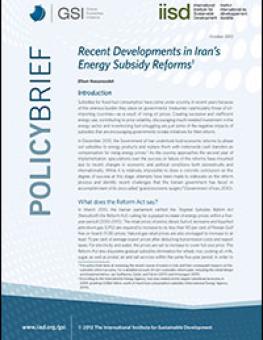
Recent Developments in Iran's Energy Subsidy Reform
In 2009, the International Energy Agency (IEA) estimated that Iran's subsidies for fossil-fuel consumption were US$66 billion, the highest of any country.
In 2010, it took bold economic reforms to phase out energy subsidies with the aim of preventing wasteful consumption, equitably distributing national wealth, strengthening the competitiveness of key industries and increasing the country's export capacity. The reform plan has been praised by international organizations, including the International Monetary Fund, for its well-designed mitigating measures, including a substantive cash transfer scheme.
Almost two years into the reforms and within the context of harsh economic conditions mostly resulting from international sanctions, questions have arisen as to the success or failure of the reform plan. A soaring inflation rate, dramatic volatility in the foreign exchange market and rising commodity prices have significantly undermined the price reforms and the value of cash handouts which have been paid on a nationwide scale to compensate for the higher energy prices.
This policy brief outlines recent developments since the reforms were implemented and sheds some light on the impacts that the reforms—once referred to as the country's "grand economic surgery"—have had.
You might also be interested in
The Cost of Fossil Fuel Reliance
Government support for fossil fuels reached at least USD 1.5 trillion in 2023, new data shows.
Increased Support Needed to Achieve India's Clean Energy Goals
India is on track to achieve many of its 2030 clean energy goals but needs to step up government support measures to accelerate the deployment of offshore wind, electric vehicles, and green hydrogen, according to a new report.
Ending Export Credits for Oil and Gas: How OECD countries can end 2024 with a climate win
For a year now, Organisation of Petroleum Exporting Countries (OECD) governments have been negotiating an agreement that could put an end to oil and gas export finance. Following the acrimony in Baku, this would be a very real way for the OECD to show policy coherence, respond to calls from the poorest countries to stop subsidizing fossil fuels, and shift public finance to solutions.
Fossil Fuel Production, Renewable Energy, and Subsidy Reform in Nationally Determined Contributions 3.0
This policy brief provides an analysis of the critical benchmarks and recommendations necessary for aligning nationally determined contributions (NDCs) with the 1.5 °C target.